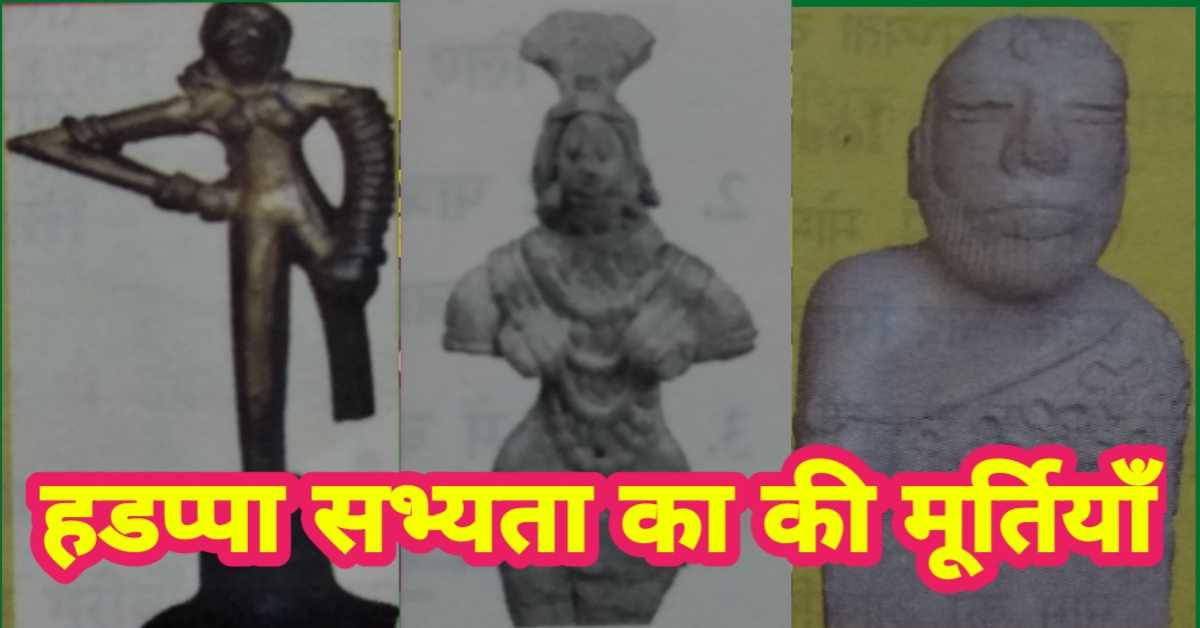
हड़प्पा सभ्यता की मूर्तियाँ | Statues of Harappan Civilization
हड़प्पाई मूर्तिकार त्रि-आयामी कृतियों से व्यवहार करने में बहुत कुशल थे। तत्कालीन समय में उन्होंने मोहरों, कांस्य मूर्तियों और मृद्भाण्डों का निर्माण किया है।
Harappan sculptors were very skilled in dealing with three-dimensional creations. During that time they made seals, bronze sculptures and pottery.
कांस्य मूर्तियाँ- हड़प्पा सभ्यता कांस्य मूर्तियों के निर्माण की साक्षी रही है। कांस्य मूर्तियों के निर्माण के लिए 'लुप्त मोम तकनीक' का प्रयोग किया जाता था। इस तकनीक के अंतर्गत मोम से निर्मित मूर्ति पर मिट्टी लेपित की जाती है। तत्पश्चात् इसे सूखने दिया जाता है। पूर्णरूपेण सूखने के बाद इसे गर्म किया जाता है। इससे अंदर का समस्त मोम पिघल जाता है। फिर इसे एक छिद्र से बाहर निकाल दिया जाता है। शेष बचे मिट्टी के ढाँचे में पिघले हुए धातु को डाला जाता है। फिर इसे सूखने दिया जाता है, जिससे धातु साँचे के आकार में जम जाता है। तत्पश्चात् मिट्टी को हटा दिया जाता है। इससे उस प्रकार की मूर्ति बन जाती है, जैसी मोम की मूर्ति थी। वर्तमान में भी इस तकनीक का प्रयोग किया जाता है।
Bronze Sculptures- The Harappan Civilization has witnessed the making of bronze sculptures. The 'vanishing wax technique' was used for the manufacture of bronze sculptures. Under this technique clay is coated on the idol made of wax. Thereafter it is allowed to dry. After it dries completely, it is heated. This melts all the wax inside. It is then taken out through an orifice. The molten metal is poured into the remaining clay mold. It is then allowed to dry, allowing the metal to solidify into the shape of the mold. The soil is then removed. This creates the kind of idol that was made of wax. This technique is still used today.
इन 👇एतिहासिक महत्वपूर्ण प्रकरणों को भी पढ़ें। प्रमुख मूर्तियाँ- मोहनजोदड़ो से प्राप्त कांस्य नर्तकी, कालीबंगा से प्राप्त कांस्य बैल
कांस्य नर्तकी- मोहनजोदड़ो से कांस्य नर्तकी प्राप्त हुई है। इस मूर्ति में एक महिला को बाएँ हाथ में चूड़ियाँ एवं दाएँ हाथ में कंगन और ताबीज पहने हुए दिखाया गया है। यह नर्तकी अपने दायें हाथ को कूल्हे पर रखकर त्रिभंग-नृत्य मुद्रा में खड़ी है। यह विश्व की सबसे पुरानी कांसे की मूर्ति है। यह चार इंच की मूर्ति है। इस मूर्ति में नर्तकी ने केवल आभूषण पहने हैं।
Bronze dancer- Bronze dancer has been found from Mohenjodaro. The idol depicts a woman wearing bangles in her left hand and bracelets and amulets in her right hand. This dancer is standing in Tribhanga-nritta posture with her right hand on her hip. This is the oldest bronze statue in the world. It is a four inch statue. In this idol the dancer is wearing only jewellery.
टेराकोटा- इन मूर्तियों का निर्माण पकी हुई मिट्टी से किया जाता था। ये मूर्तियाँ काँसे की मूर्तियों की तुलना में कम संख्या में प्राप्त हुई हैं। ये मूर्तियाँ अनगढ़ हैं। इनका निर्माण पिचिंग विधि से किया जाता है। ये मूर्तियाँ मुख्य रूप से कालीबंगा और गुजरात से प्राप्त हुई हैं।
Terracotta- These idols were made from baked clay. These idols have been found in less number than bronze idols. These idols are unmatched. These are manufactured with pitching method. These idols are mainly found from Kalibanga and Gujarat.
"भारतीय कला एवं संस्कृति" के इन 👇 प्रकरणों को भी पढ़ें। टेराकोटा मूर्तियाँ- मातृ देवी की मूर्ति, खिलौने, सींग वाले देवता का मुखौटा आदि।
Terracotta Sculptures- Mother Goddess Statue, Toys, Horned God Mask etc.
मातृदेवी- मातृदेवी की मूर्तियाँ बहुत से सिंधु स्थलों से प्राप्त हुई हैं। इससे इनके महत्व का पता चलता है। यह मूर्ति उन्नत वक्षस्थल पर कंठहार पहने हुए खड़ी महिला की है। इस मूर्ति पर उसे कमर पर धोती या कटिवस्त्र और करधनी पहने हुए दिखाया गया है। इसने सिर पर पंखाकार मुकुट भी पहना है। मूर्ति के चेहरे का रूपांकन अनगढ़ है। इस पर कुशलता का अभाव है। यह शायद समृद्धि का प्रतीक मानी जाती होगी। यह उर्वरता की देवी रही होगी।
Matridevi- Idols of Mother Goddess have been found from many Indus sites. This shows their importance. This idol is of a woman standing on an elevated breastbone wearing a necklace. On this idol he is shown wearing a dhoti or kativastra and a girdle at the waist. He is also wearing a feathered crown on his head. The face motif of the idol is unadorned. There is a lack of skill on this. It may have been considered a symbol of prosperity. It must have been the goddess of fertility.
इन 👇एतिहासिक महत्वपूर्ण प्रकरणों को भी पढ़ें। दाढ़ी वाले पुजारी- यह मोहनजोदड़ो से प्राप्त स्टेटाइट की मूर्ति है। यह एक अर्ध्द-प्रतिमा (शरीर का ऊपरी हिस्सा) है। यह तिपतिया (ट्रेफोइल) पैटर्न की शॉल में लिपटे हुए दाढ़ी वाले पुजारी की मूर्ति है। इसमें पुजारी की आँखें लंबी और आधी बंद हैं। मानो लगता है कि वह ध्यान मुद्रा में हो। इसके दाहिने हाथ पर बाजूबंद और सिर पर साधारण रूप से निर्मित पट्टीका है।
Major Statues- Bronze Dancer from Mohenjodaro, Bronze Bull from Kalibanga
The Bearded Priest- This is a statite statue from Mohenjodaro. It is an Arddha-Pratima (upper part of the body). It is a statue of a bearded priest wrapped in a shawl of shamrock (trefoil) pattern. In this the priest's eyes are long and half closed. It is as if he is in meditation posture. It has an armband on its right hand and a simple band on its head.
पुरुष धड़- हड़प्पा से प्राप्त पुरुष धड़ लाल बलुआ पत्थर से निर्मित है। इसकी दिशा आगे की ओर है। इस मूर्ति के कंधे पके हुए और पेट निकला हुआ है। सिर और भुजाओं को जोड़ने के लिए गर्दन और कंधे पर सॉकेट छिद्र किए गए हैं।
Male torso- The male torso found from Harappa is made of red sandstone. Its direction is forward. The shoulders of this idol are cooked and the stomach is protruding. Sockets are perforated on the neck and shoulders to connect the head and arms.
इन 👇एतिहासिक महत्वपूर्ण प्रकरणों को भी पढ़ें। आशा है, उपरोक्त जानकारी परीक्षार्थियों / विद्यार्थियों के लिए ज्ञानवर्धक एवं परीक्षापयोगी होगी। संबंधित जानकारी नीचे देखें।
आशा है, उपरोक्त जानकारी उपयोगी एवं महत्वपूर्ण होगी। 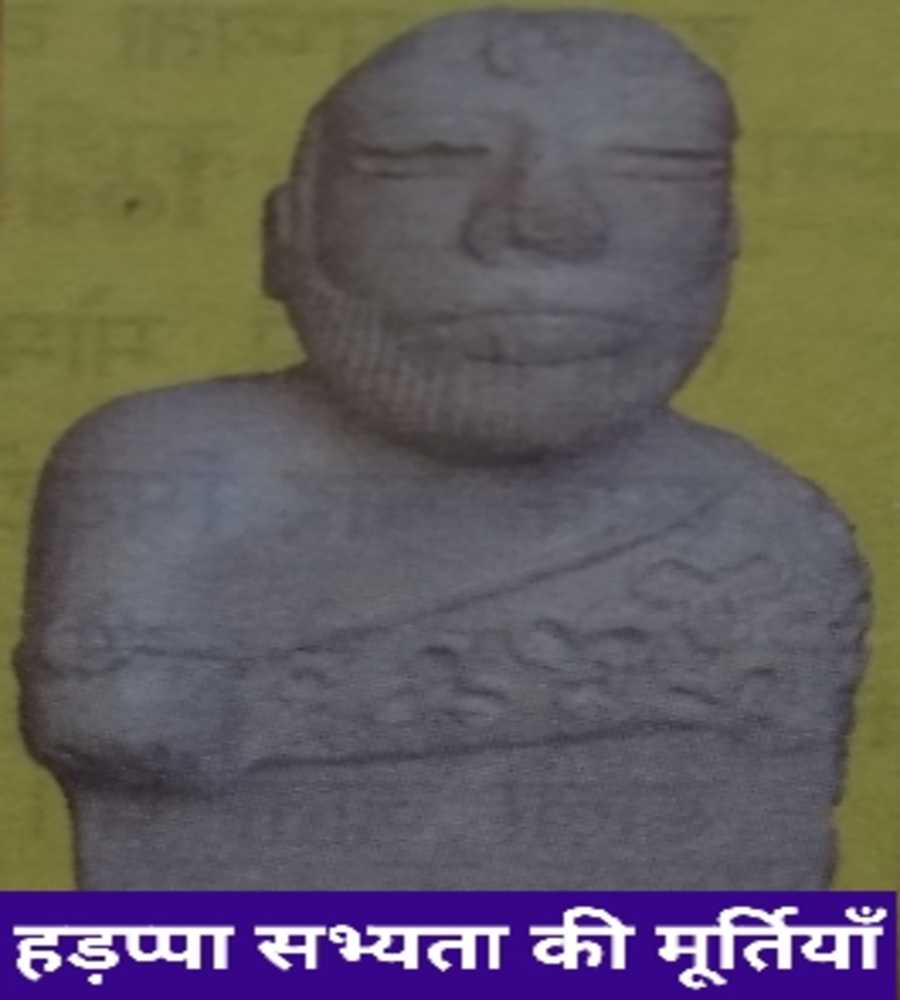
1. विश्व की प्रथम चार सभ्यताएँ- मेसोपोटामिया, मिस्र, सिंधु, और चीनी सभ्यता
2. भारत का इतिहास- प्राचीन भारतीय इतिहास के अध्ययन के पुरातात्विक स्रोत।
3. भारत का इतिहास- प्राचीन भारतीय इतिहास जानने के साहित्यिक स्त्रोत- वेद
4. भारत का इतिहास- सिंधु सभ्यता के प्रमुख स्थल
5. सिन्धु सभ्यता में जीवन 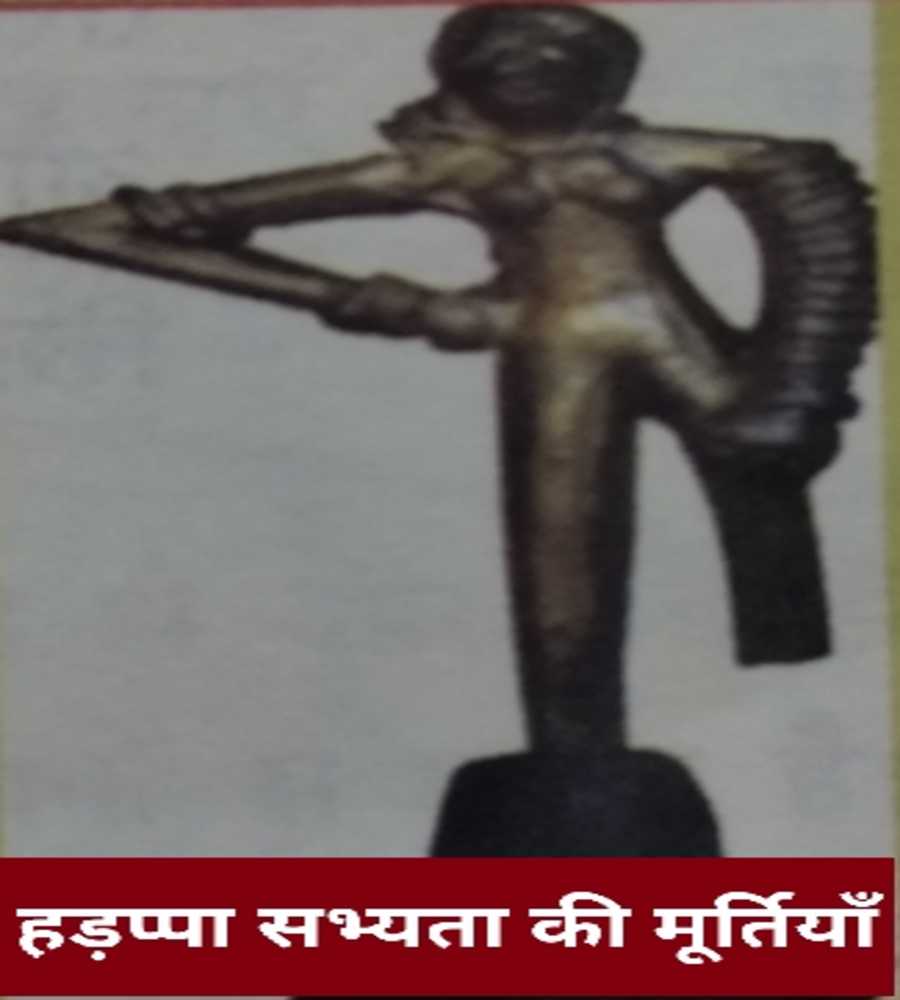
1. भारत की वास्तुकला, मूर्तिकला एवं मृद्भाण्ड
2. हड़प्पा सभ्यता के स्थल एवं उनसे प्राप्त वास्तुकला एवं मूर्तिकला के उदाहरण
3. हड़प्पा सभ्यता की वास्तुकला
4. हड़प्पा सभ्यता की मोहरें
1. वैदिक सभ्यता- ऋग्वैदिक काल
2. मध्यप्रदेश का प्राचीन इतिहास
3. भारत का इतिहास- बुद्ध के समय के प्रमुख गणराज्य (गणतंत्र)
4. भारत का प्राचीन इतिहास-;जनपद एवं महाजनपद
5. भारत का प्राचीन इतिहास-;जनपद एवं महाजनपद
1. सिकंदर का भारत पर आक्रमण- इसके कारण एवं प्रभाव
2. जैन धर्म के 24 तीर्थंकर एवं महावीर स्वामी की पारिवारिक जानकारी
3. बौद्ध धर्म एवं बुद्ध का जीवन परिचय
4. मगध साम्राज्य का इतिहास | The Magadh Empire time period
धन्यवाद।।
R F Temre
rfcompetition.com
(Watch related information below) 👇🏻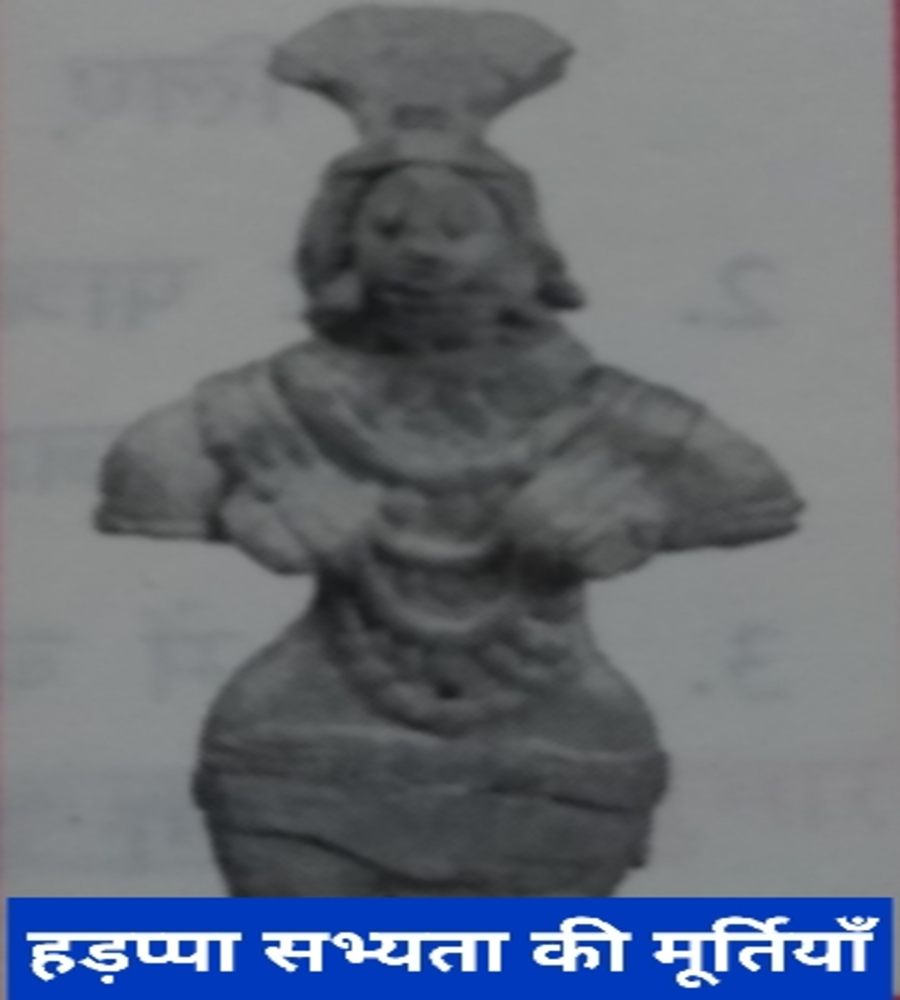
(I hope the above information will be useful and important. )
Thank you.
R. F. Tembhre
(Teacher)
pragyaab.com
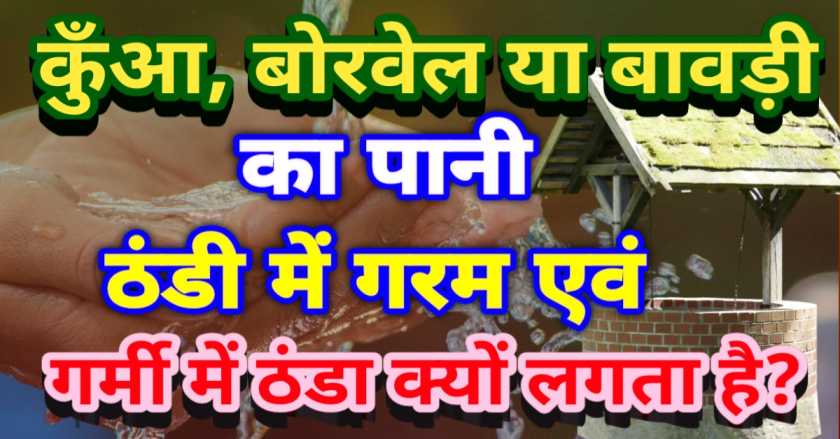



Comments